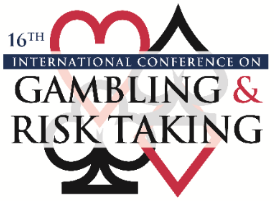Session Title
Session 3-3-D: SPECIAL PANEL Bingo: From Margin to Centre
Presentation Type
Event
Location
The Mirage Hotel & Casino, Las Vegas, Nevada
Start Date
9-6-2016 2:00 PM
End Date
9-6-2016 3:30 PM
Disciplines
Economics | Gaming and Casino Operations Management | Hospitality Administration and Management | International Business | Mental and Social Health | Psychology | Public Affairs, Public Policy and Public Administration | Sociology | Statistics and Probability | Substance Abuse and Addiction | Tourism and Travel
Abstract
Brazil, the host of the 2014 World Cup and the 2016 Olympics, is known for strong competitive traditions in sports and games. It is also one of only three G-20 countries (together with Saudi Arabia and Indonesia) that currently bans non-state provision of gambling products. Bingo was a notable exception to this prohibition, after enabling legislation was enacted in 1993, with the intention that proceeds would help fund national sports development. The game quickly became very popular but there were persistent questions about, and contestations over, the capacity of the regulatory framework to control the dual risks of exploitation of bingo consumers, and corruption of politicians and public officials by bingo entrepreneurs. By the mid-2000s the enabling framework had been abandoned and the game returned to the domain of illegality.
Brazilian judges played an active and prominent role in the regulation of bingo during the shifts from prohibition to legalisation and back to prohibition. This paper critically and contextually analyses the complexities of judicial engagement with bingo regulation, focusing in particular on the ways that Brazilian judges have deployed social, economic, and political considerations to justify both permission and prohibition of commercial bingo houses. Recognising that contradictory and incoherent judicial decision-making is not unique to bingo law, the paper seeks to understand how the judiciary contributes to the governance of gambling in a setting where corruption is constructed as endemic.
Keywords
Bingo--Law and legislation, Brazil, Courts, Gambling, Judges
Streaming Media
Included in
Economics Commons, Gaming and Casino Operations Management Commons, International Business Commons, Psychology Commons, Public Affairs, Public Policy and Public Administration Commons, Sociology Commons, Statistics and Probability Commons, Substance Abuse and Addiction Commons, Tourism and Travel Commons
Ready, Set, and Go Back: The Role of the Judiciary in Brazil’s Bingo Ban
The Mirage Hotel & Casino, Las Vegas, Nevada
Brazil, the host of the 2014 World Cup and the 2016 Olympics, is known for strong competitive traditions in sports and games. It is also one of only three G-20 countries (together with Saudi Arabia and Indonesia) that currently bans non-state provision of gambling products. Bingo was a notable exception to this prohibition, after enabling legislation was enacted in 1993, with the intention that proceeds would help fund national sports development. The game quickly became very popular but there were persistent questions about, and contestations over, the capacity of the regulatory framework to control the dual risks of exploitation of bingo consumers, and corruption of politicians and public officials by bingo entrepreneurs. By the mid-2000s the enabling framework had been abandoned and the game returned to the domain of illegality.
Brazilian judges played an active and prominent role in the regulation of bingo during the shifts from prohibition to legalisation and back to prohibition. This paper critically and contextually analyses the complexities of judicial engagement with bingo regulation, focusing in particular on the ways that Brazilian judges have deployed social, economic, and political considerations to justify both permission and prohibition of commercial bingo houses. Recognising that contradictory and incoherent judicial decision-making is not unique to bingo law, the paper seeks to understand how the judiciary contributes to the governance of gambling in a setting where corruption is constructed as endemic.

Comments
Attachment: PDF containing 24 slides
Audio recording of session is attached as a downloadable MP3 audio file, 43.20 MB